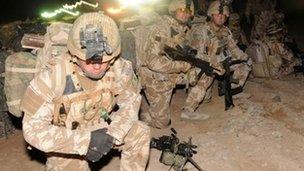Forces veterans' and families health care is examined in Welsh government report
- Published
The health care that armed forces veterans receive in Wales, and whether it needs to improve, is the subject of a report to be published later.
Healthcare Inspectorate Wales has asked individuals about their experiences, as well as groups like Combat Stress.
Veterans should have priority treatment from the NHS if their needs come from their time in the military.
The Welsh government has pledged to improve the support offered to armed forces personnel and their families.
In a message for British Forces Broadcasting Service (BFBS), broadcast on Christmas Day, First Minister Carwyn Jones pledged more support in areas like health and housing, saying the forces "deserve nothing less".
The Healthcare Inspectorate Wales report is carried out in support of the Welsh Government's Expert Group on the Needs of the Armed Forces Community in Wales.
Adrian Weale, of the British Armed Forces Federation, told BBC Radio Wales: "The current arrangement is that veterans go in to the NHS and they are treated more or less on same basis that every one else is.

Members of the 1st Battalion The Royal Welsh in Afghanistan in February 2010
"There is principle that veterans should have priority but in practice that doesn't often work out.
'Some understanding'
"Once they come out of the military, then they are in to the NHS and reliant on what the NHS can provide and also what charities like the British Legion and Combat Stress and so forth can give them."
He said the UK had a growing number of armed forces veterans stretching back to World War II and the Korean War whose health conditions in some way reflected having served their country in conflict.
The federation would like to see a system of veterans health care similar to the one in America with military hospitals which offered lifelong care of veterans from the time they leave the military, he said.
He added: "We're not suggesting that should be a military hospital in every town, but regional centres that can provide some specialist care with some understanding of what the patients have been through, we think would be a very good idea."
- Published21 December 2011
- Published11 March 2011
- Published20 December 2011